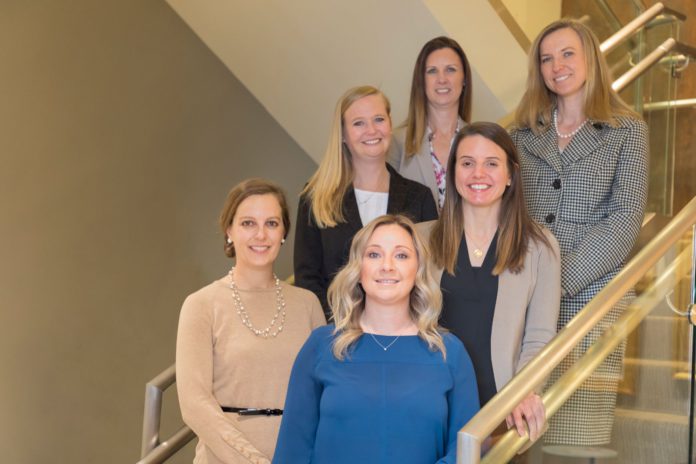
The success gap between women and men in reaching the highest levels of the legal profession is no secret: According to a 2017 report from the American Bar Association, women make up 18 percent of equity partners in private law firms and 18 percent of managing partners at the largest 200 law firms. They populate the associate ranks at 45 percent and make up a majority of law students.
But Ballard Spahr’s public finance group in Denver is bucking those statistics at 100 percent female. The group’s partners say it might be unique to their practice area, but they’ve always felt they can focus on being strong lawyers and let their work speak for itself.
“The key, to me, is to just be a good lawyer,” said partner Anastasia Khokhryakova. “It doesn’t matter what your gender is. If you’re a good lawyer, people will continue to use you and refer work to you.”
The firm re-established its public finance presence in Denver when Khokhryakova joined in 2013 with the goal of creating the group.
Even after associate Brittany Barrient joined in 2016, the practice remained small until January, when partners Hester Parrot and Kim Reed came from Kutak Rock along with associate Anne Bensard and paralegal Kerstin Stevenson. Associate Malia Rogers is expected to join the group after she passes the Colorado bar exam later this month.
“So two to seven in two months,” Reed said of the practice group’s growth in Denver. Khokhryakova said Ballard Spahr currently has public finance practices in 10 of its 15 offices across the U.S., with the possibility of eventually having the practice in all of them. The firmwide practice is chaired by Emilie Ninan out of Delaware.
The partners insisted the Denver group’s all-women makeup didn’t happen on purpose. Public finance practice is a small world in Colorado, they said, so they have known each other for years through their work.
“It’s a happy circumstance,” Reed said. “It certainly is in line with the firm’s goals with respect to diversity. … And I think it’s a great thing for the Denver public finance community too.”
She said they are an example of women who have reached a high level in practicing law, despite the profession’s challenges, and can support each other as part of the same group. Reed said she hopes the group can set an example for others who want to follow the same path.
Parrot said seeing the support Khokhryakova has received from Ballard Spahr helped draw her to the firm.
“Her success at Ballard is evidence of the firm’s ability to support female and male attorneys,” she said. “And them bringing Kim and me over here [is] again, just an example of their commitment to diversity and women, it’s just a really great move.” Reed added the firm’s praise of Khokhryakova’s success growing the public finance group in Denver and eagerness to bring her and Parrot on as a part of it attracted them.
The partners said they believe the importance of being a good lawyer first, regardless of gender, was also true when they each began practicing, again saying the split could be driven by the small size of public finance practice. Khokhryakova and Reed have each practiced for about 19 and 20 years, and Parrot began 11 years ago.
While Reed has spent her legal career working in public finance, Khokhryakova practiced in corporate securities for three years before switching, and Parrot worked as a trustee for U.S. Bank prior to going into private practice.
“I don’t know if our experience is reflective of the legal community as a whole or not,” Reed said. “Or if it’s unique because [public finance] is such a small community and we all work with each other, and you very quickly either earn a good reputation or earn a bad reputation.”
Khokhryakova speculated women might have an easier time succeeding in public finance practice because it’s more collaborative and less contentious than some other areas such as litigation.
“Maybe it’s a little easier for women to succeed because our personalities are more collaborative,” she said. “I don’t want to make generalizations, but my perception is there’s a lot more women in public finance, not just in the legal world, but generally in the industry than maybe in other industries.”
The partners each expressed different hopes for the state of the legal profession to close gender gaps by the time they finish their careers.
Khokhryakova said although firms have started to offer more flexible scheduling to accommodate balancing work and home life, she wants the flexibility to continue increasing.
Parrot said she hopes for more transparency in compensation comparisons between women and men. Although much of the conversation about gender disparities in the legal profession focuses on partner and management positions, she said, compensation is an equally important issue.
Reed said related to flexibility in scheduling and compensation, she wants the thinking about how contributions are evaluated to continue evolving.
Lawyers can be productive even without being tied to their desks for a set schedule each day, she explained, and evaluations should reflect that.
“Having the evaluation process evolve in a way that really recognizes how people are truly contributing, because it’s not just sitting in the office and it’s not just the face time,” she said. “There’s a lot of other ways that people are contributing that sometimes are not seen, because they are taking advantage of that flexibility.”
—Julia Cardi

